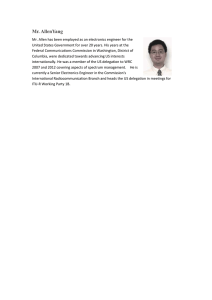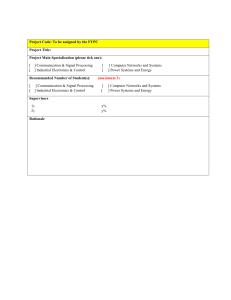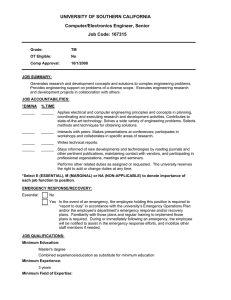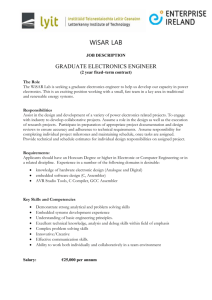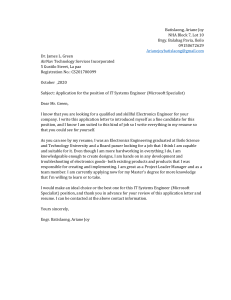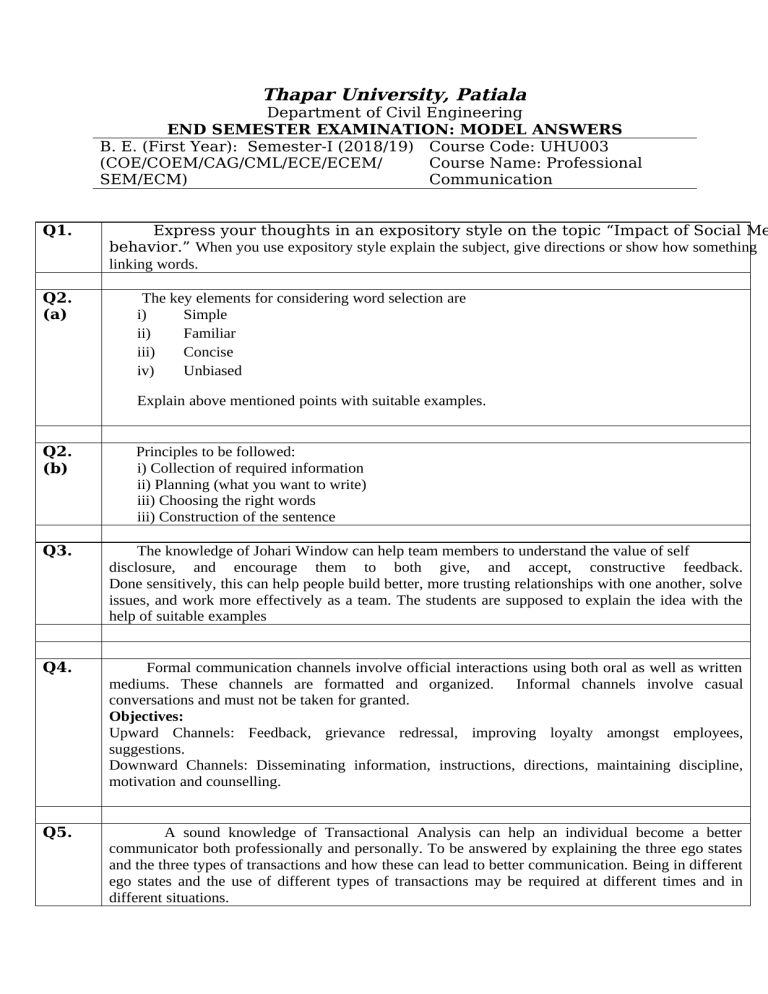
Thapar University, Patiala Department of Civil Engineering END SEMESTER EXAMINATION: MODEL ANSWERS B. E. (First Year): Semester-I (2018/19) Course Code: UHU003 (COE/COEM/CAG/CML/ECE/ECEM/ Course Name: Professional SEM/ECM) Communication Q1. Q2. (a) Express your thoughts in an expository style on the topic “Impact of Social Me behavior.” When you use expository style explain the subject, give directions or show how something linking words. The key elements for considering word selection are i) Simple ii) Familiar iii) Concise iv) Unbiased Explain above mentioned points with suitable examples. Q2. (b) Principles to be followed: i) Collection of required information ii) Planning (what you want to write) iii) Choosing the right words iii) Construction of the sentence Q3. The knowledge of Johari Window can help team members to understand the value of self disclosure, and encourage them to both give, and accept, constructive feedback. Done sensitively, this can help people build better, more trusting relationships with one another, solve issues, and work more effectively as a team. The students are supposed to explain the idea with the help of suitable examples Q4. Formal communication channels involve official interactions using both oral as well as written mediums. These channels are formatted and organized. Informal channels involve casual conversations and must not be taken for granted. Objectives: Upward Channels: Feedback, grievance redressal, improving loyalty amongst employees, suggestions. Downward Channels: Disseminating information, instructions, directions, maintaining discipline, motivation and counselling. Q5. A sound knowledge of Transactional Analysis can help an individual become a better communicator both professionally and personally. To be answered by explaining the three ego states and the three types of transactions and how these can lead to better communication. Being in different ego states and the use of different types of transactions may be required at different times and in different situations. Q6. Internal –presented to the organization for seeking funds for departmental purposes. External: presented by organizations to external agencies for funding, more projects etc. Solicited: Writing a proposal in Response to other agencies/government departments who advertise their need for outside support in their activities. Unsolicited: Sending a proposal without a specific request from the prospective clients. The Important points to be considered while writing a proposal are: • Logical Plan • Explain the Benefits • Details of everything the reader wants to know • Explain with illustrations why you should be chosen • If possible, add positive comments from your existing clients • Attractive • Error Free Responding to an RFP • Spend considerable time in preparing a proposal • Use Standard Format/User Specified • Focus on requirement of the user Remember to respond to the standard queries and provide solutions to them. • Propose what is practical • Include Past experiences Specify the required time frame. Q7. The format followed should be Block/modified block. The first paragraph of the letter should attract the reader’s attention and stimulate the interest of the recuiter with a reference to acheivements and learnings from the previous job. The second paragraph should highlight strongest qualifications required for the position one is applying for along with a mention of special skills and abilities that could benefit the employer. The letter should close with a positive note of action. Q8. A detailed description of the elements of Completeness, Conciseness, Consideration Concreteness, Clarity, Courtesy, Correctness. Each element should be suitably substantiated. Q9. Non verbal signals are unconscious parts of our behavior which are deeply rooted in our entire makeup. The ability to use and understand nonverbal cues is a powerful tool to connect with others, build better relationships and express and convey what you really mean. The students should display an understanding of the nonverbal clusters that are associated with responsive, reflective, combative and fugitive responses by combining open-close, backward-forward bodily postures and gestures. How non verbal cues like our gestures, the way we sit or stand, how loud or fast we speak, how close we stand and how much eye contact we make, etc., send strong messages. Q10. Indicative Sample for Resume: ANTRIKSH TYAGI Electronics Engineer Email: antriksh_xxxxxx8@yahoo.co.in Contact No: 095xxxxxxx, 082xxxxxxxx OBJECTIVE To work efficiently and effectively as well as grow with a prestigious organization in the field of Electronics Engineering so as to achieve self-realization and accomplishment of organizational goals. ACADEMIC QUALIFICATION -Technically qualified as B.Tech graduate in Electronics and Communication field from Uttarakhand Technical university with 64.30% in 2010. -Passed HSC (Intermediate) with 54.20% in 2006. -Passed SSC (High School) with 57.80% in 2004. EXPERIENCE -Currently working at "xxxxxxxx System Pvt Ltd." New Delhi as an "Electronics Engineer " in R&D Department From July 2012 to present. JOB RESPONSIBILITIES -As an Electronics engineer maintenance and monitoring of various project. -Testing and Designing of circuits and PCB using ORCAD 9.1 -R&D in projects according in customer requirement. -Testing of PCBs, Connectors, Power Supplies and Signal Conditioners. -Final designing Fault finding in PCB & Circuit. -Facilitation inspection and designing of new product as well as component before starting designing. Worked at "xxxxxxxx Pvt Ltd." as an "Electronics Engineer " in R&D Deapartment From June 2011 to july2012. JOB RESPONSIBILITIES -As an Electronics engineer maintenance and monitoring of various project. -Testing and Designing of circuits and PCB using ORCAD 9.1 -R&D in projects according in customer requirement. -Testing Sensors, PCBs, Connectors, Power Supplies and Signal Conditioners. -Final designing in PCB & instrument. -Fault finding in PCB and machine. -Monitoring and maintaining daily target as required in project. -Calibration of all equipment as per requirement and jig. Worked at "xxxxxx pvt ltd" as an "Electronics Engineer" in R&D Department From June 2010 to June 2011. Training: -4 weeks industrial training on "Signaling & Digital Signal Processing" in June, 2009. -4 weeks industrial training on "Turbine Manufacturing & CNC Machines" in July, 2008. ACHIEVEMENTS -Efficiency predicted the faults of some components in projects (Device) this improved the accuracy and efficiency. -Successfully established the ISO rules in R&D department for standard testing and designing procedures. -Solely entrusted with the responsibility of performing the reliability tests for the product which was successfully executed. -Joined the company as a graduate engineer trainee and was prompted to the Electronics engineer in Jan2011. SOFTWARE SKILLS -Programming Languages : Embedded C -Operating Systems : Windows XP/ vista/2000/98/95 -Documentation Tools : MS-Word, MS- PowerPoint, MS-Excel, -Designing Tools : Orcad 9.1, Corel Draw PERSONAL DETAILS -Date of Birth : -Father’s Name : -Current Address : -Permanent Address : -Languages : -Cell Phone : -Gender :
